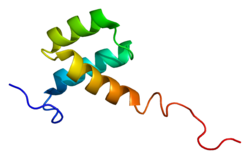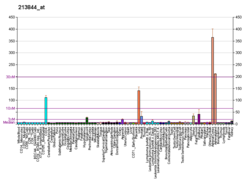HOXA5
Homeobox protein Hox-A5 is a protein that in humans is encoded by the HOXA5 gene.[5][6][7]
Function
In vertebrates, the genes encoding the class of transcription factors called homeobox genes are found in clusters named A, B, C, and D on four separate chromosomes. Expression of these proteins is spatially and temporally regulated during embryonic development. This gene is part of the A cluster on chromosome 7 and encodes a DNA-binding transcription factor which may regulate gene expression, morphogenesis, and differentiation. Methylation of this gene may result in the loss of its expression and, since the encoded protein upregulates the tumor suppressor p53, this protein may play an important role in tumorigenesis.[7]
HoxA5 is controlled, at least in part, by DNA methylation.[8] HoxA5 has been shown to upregulate the tumor suppressor p53 and AKT1 by downregulation of PTEN.[9] Suppression of HoxA5 has been shown to attenuate hemangioma growth.[10] HoxA5 has far-reaching effects on gene expression, causing ~300 genes to become upregulated upon its induction in breast cancer cell lines.[11] HoxA5 protein transduction domain overexpression prevents inflammation shown by inhibition of TNFα-inducible monocyte binding to HUVECs.[12][13]
Comparison of the HoxA5 promoter methylation profile across cell types from the least differentiated (human embryonic stem cells) to the most endothelial-like (human umbilical vein endothelial cells, or HUVECs) shows that the HoxA5 promoter is normally heavily methylated in non-differentiated cells and becomes demethylated as cells differentiate down the endothelial lineage.[14] HoxA5 contains a C-Amp Response Elements (CRE) in its promoter.[8] POL2 and CTCF binding are enriched at the CpG-dense HoxA5 promoter in HUVECs, demonstrating transcriptional activity.[14]
Clinical significance
HoxA5 is suppressed in acute myeloid leukemia (AML), and the DNMT inhibitor decitabine (5Aza) is used to treat this disease. While HoxA5 is known to be hypermethylated in AML, it has not yet been shown whether decitabine directly targets these genes for demethylation.[15][16]
See also
References
- ^ a b c GRCh38: Ensembl release 89: ENSG00000106004 – Ensembl, May 2017
- ^ a b c GRCm38: Ensembl release 89: ENSMUSG00000038253 – Ensembl, May 2017
- ^ "Human PubMed Reference:". National Center for Biotechnology Information, U.S. National Library of Medicine.
- ^ "Mouse PubMed Reference:". National Center for Biotechnology Information, U.S. National Library of Medicine.
- ^ McAlpine PJ, Shows TB (Jul 1990). "Nomenclature for human homeobox genes". Genomics. 7 (3): 460. doi:10.1016/0888-7543(90)90186-X. PMID 1973146.
- ^ Scott MP (Nov 1992). "Vertebrate homeobox gene nomenclature". Cell. 71 (4): 551–3. doi:10.1016/0092-8674(92)90588-4. PMID 1358459. S2CID 13370372.
- ^ a b "Entrez Gene: HOXA5 homeobox A5".
- ^ a b Dunn J, Thabet S, Jo H (Jul 2015). "Flow-Dependent Epigenetic DNA Methylation in Endothelial Gene Expression and Atherosclerosis". Arteriosclerosis, Thrombosis, and Vascular Biology. 35 (7): 1562–9. doi:10.1161/ATVBAHA.115.305042. PMC 4754957. PMID 25953647.
- ^ Arderiu G, Cuevas I, Chen A, Carrio M, East L, Boudreau NJ (2007). "HoxA5 stabilizes adherens junctions via increased Akt1". Cell Adhesion & Migration. 1 (4): 185–95. doi:10.4161/cam.1.4.5448. PMC 2634105. PMID 19262140.
- ^ Zhu Y, Cuevas IC, Gabriel RA, Su H, Nishimura S, Gao P, Fields A, Hao Q, Young WL, Yang GY, Boudreau NJ (Jun 2009). "Restoring transcription factor HoxA5 expression inhibits the growth of experimental hemangiomas in the brain". Journal of Neuropathology and Experimental Neurology. 68 (6): 626–32. doi:10.1097/NEN.0b013e3181a491ce. PMC 2728585. PMID 19458547.
- ^ Chen H, Rubin E, Zhang H, Chung S, Jie CC, Garrett E, Biswal S, Sukumar S (May 2005). "Identification of transcriptional targets of HOXA5". The Journal of Biological Chemistry. 280 (19): 19373–80. doi:10.1074/jbc.M413528200. PMID 15757903.
- ^ Lee JY, Park KS, Cho EJ, Joo HK, Lee SK, Lee SD, Park JB, Chang SJ, Jeon BH (Jul 2011). "Human HOXA5 homeodomain enhances protein transduction and its application to vascular inflammation". Biochemical and Biophysical Research Communications. 410 (2): 312–6. doi:10.1016/j.bbrc.2011.05.139. PMID 21664342.
- ^ Chen Y, Gorski DH (Feb 2008). "Regulation of angiogenesis through a microRNA (miR-130a) that down-regulates antiangiogenic homeobox genes GAX and HOXA5". Blood. 111 (3): 1217–26. doi:10.1182/blood-2007-07-104133. PMC 2214763. PMID 17957028.
- ^ a b Dunn J, Simmons R, Thabet S, Jo H (Oct 2015). "The role of epigenetics in the endothelial cell shear stress response and atherosclerosis". The International Journal of Biochemistry & Cell Biology. 67: 167–76. doi:10.1016/j.biocel.2015.05.001. PMC 4592147. PMID 25979369.
- ^ Strathdee G, Sim A, Soutar R, Holyoake TL, Brown R (Feb 2007). "HOXA5 is targeted by cell-type-specific CpG island methylation in normal cells and during the development of acute myeloid leukaemia". Carcinogenesis. 28 (2): 299–309. doi:10.1093/carcin/bgl133. PMID 16861263.
- ^ Kim SY, Hwang SH, Song EJ, Shin HJ, Jung JS, Lee EY (Oct 2010). "Level of HOXA5 hypermethylation in acute myeloid leukemia is associated with short-term outcome". The Korean Journal of Laboratory Medicine. 30 (5): 469–73. doi:10.3343/kjlm.2010.30.5.469. PMID 20890077.
External links
- HOXA5+protein,+human at the U.S. National Library of Medicine Medical Subject Headings (MeSH)
This article incorporates text from the United States National Library of Medicine, which is in the public domain.








